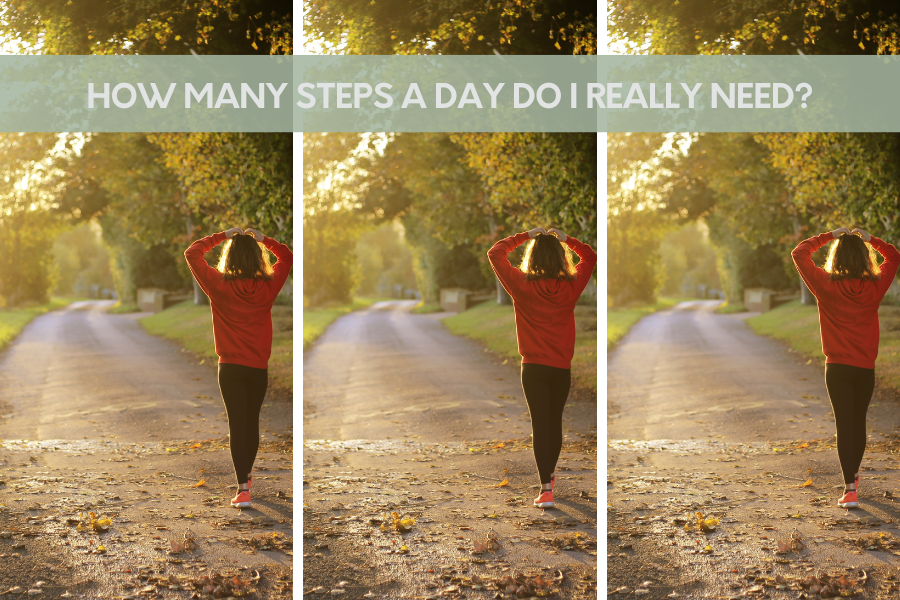The Bizare Origins Of The 10k-Steps-A-Day Goal

I’ll fully admit I have been completely on board with the 10k-steps-a-day advice since I first heard about it many years ago. Promptly buying myself a pedometer to track my steps. Yes, it was that long ago!!! This number has been swung around for literal decades, way before smartphones and watches were a thing.
Now our devices have the 10k target set in as the gold standard, but where did it actually come from? And how many steps do I needs to do in a day depending on what my goals are?
In a world where we are sitting more and doing less manual jobs, it’s important to remain mindful of how much we are moving on a day-to-day basis.
I still to this day work with clients to help them increase their daily movement for better health and weight loss results, because of the fact that many of us now spend most of our time sitting for hours at a computer.
None Exercise Activity Thermogenesis (NEAT) is an important part of the weight loss equation, and so it’s one of the key recommendations I always want to help clients move closer towards.
>>>11 Simple Strategies To Help You Lose Weight Naturally<<<
In my naivety back when I first committed to working towards this daily goal, I didn’t even question where the 10k steps number came from. It just became widely accepted by everyone I knew in the health and wellness industry, so we all just went with it.
So I was pretty surprised to learn that the number was not something that was rooted in scientific research.
Where Did The Number Come From?
It was actually created by the Japanese marketing team who were promoting the sale of pedometers around the 1964 Tokoyo Olympics.
It’s believed that the number was derived from the name of the pedometer ‘Manpo-Kei’ which translates to 10,000 step meter. It’s even been suggested that the number stuck, as the Japanese symbol for 10,000 also looks similar to that of a walking man.
So How Many Steps Do You Really Need?
There are a number of studies that have attempted to answer this question.
A study published in 2022 completed a review of the existing literature on optimal step count to reduce premature death, and here is that they found.
For people over the age of 60 was 6000–8000 steps
For younger people under the age of 60 the optimal range was found to be 8000–10000.
It’s also shown that walking faster may also be more beneficial, though further studies are needed.
In fact, a lot of the research so far has been based around observational studies and only really looked all case morality, rather than individual health issues.
In my opinion as a health coach, the answer would be……
It depends!!
If we are looking at a fairly sedentary person who isn’t very active at work, doesn’t work out. Maybe currently averages 2,000 steps per day or below. Then the target of 10,000 steps can feel overwhelming and may well seem out of reach. For a person like this, even aiming for 4–5,000 steps a day would likely see a significant improvement in many health markers.
For someone who workouts out a few times a week and eats fairly healthily already, but still spends a lot of the day sitting, then aiming for over 8–10,000 will likely be a more supportive goal.
It’s important to take into consideration where the person is starting from and what their health goals are. It’s all relative to where you are starting form and what you are working towards.
As noted above, some studies have cited that it’s not necessarily looking at the number of steps, but have found that walking at faster speeds reaps more benefits.
Again this study needs to be taken into the perspective of the individual. Yes if you are looking at a person who does not exercise, then this increase in heart rate could indeed yield even more benefits.
But, for someone who is already fairly active in terms of structured workouts or movement, then a walk should be geared more to enjoyment, mindfulness, taking time out and as a method that can be used for stress reduction.
Stress is directly linked to 6 of the leading causes of death and so could be claimed as the number one killer in our modern times.
There is a reason the Japanese also invented forest bathing, as highly stressed Japanese people were literally dropping dead at their desks. The government has highly funded research into the benefits of being immersed in nature.
Walking plus exposure to nature can create compounding health benefits.
Humans were designed to be outside, our physiology responds to nature and so I see the 10k step goal as a positive one no matter where its origins were.
If you can do your walks and have the opportunity to be surrounded by some green stuff. Well, then that’s a double bonus.
Despite their questionable reasons for setting the 10k step target, I don’t think that they were that far off the mark.
Assess where you are at right now with your step count and be mindful about making movement a part of your daily activity and life.
Do you know what your average step count is?

Connect with me:





Leave a Reply